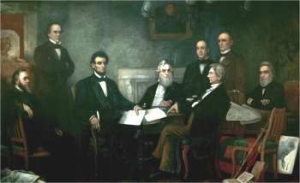In recent years, commentators have talked incessantly about the United States being divided between “red” states and “blue” states. However, as Professor Idleman’s recent post on Alabama’s 1819 admission to the Union noted, an even more fundamental distinction in pre-Civil War America was the divide between “slave” states and “free” states. Ultimately, the fear on the part of the white population of the slave states that the free states were no longer committed to the preservation of their “peculiar institution” led to the dismemberment of the Union and a bloody four-year war to reassemble it.
For the first portion of the antebellum period, the free-state versus slave-state description was more general than precise, as African slavery was initially a continental phenomenon. In 1776, slavery existed in all of the thirteen colonies (though apparently not in Vermont, which was then officially part of New York).
In 1780, Pennsylvania became the first state to abolish slavery when it adopted a statute that provided for the freedom of every slave born after its enactment (once that individual reached the age of majority). Massachusetts was the first to abolish slavery outright, doing so by judicial decree in 1783. The remaining New England states–New Hampshire, Connecticut, and Rhode Island–adopted gradual emancipation schemes modeled on Pennsylvania’s statute in the mid-1780s, and the United States Congress abolished slavery in future states north of the Ohio River in the Northwest Ordinance of 1787.
Gradual emancipation came to New Jersey in 1804 and to New York in 1817, albeit with an operational date of July 4, 1827. In 1828, New York abolished slavery outright, as did Pennsylvania in 1847 (an act that liberated the state’s fewer than 100 remaining slaves). Somewhat unusually, New Hampshire appears to have formally abolished slavery in 1857 (apparently more than a decade after the death or manumission of the last New Hampshire slave).
Between 1840 and 1850, the last slaves in Connecticut, New Hampshire, and Rhode Island either died or were emancipated, and, as a result, the only northern state where slavery continued to exist after 1850 was New Jersey, where it was limited to slaves born before 1805. Technically, slavery had still not died out in New Jersey by the time of the Civil War. The United States Census recorded 236 slaves in the Garden State in 1850, and 18 in 1860 (though by 1860, the 18 individuals were classified not as “slaves,” but as individuals “indentured for life”).
Even though gradual emancipation statutes left a handful of individuals in bondage down to the time of the Civil War, from 1817 onward, every state in the northern and western United States had committed itself to a future without slavery.
However, no such developments were forthcoming in the South. Although an effort to adopt a very gradual emancipation plan almost passed in Virginia in 1832, by 1861, slavery had not been abolished in any Southern state. Even in Delaware, where the number of slaves had dwindled to less than 2000 by 1860, the institution remained legally alive. And while a vigorous two-party competition had characterized Southern politics for much of the ante-bellum period, support for the institution of slavery created a cohesive Southern regional identity.
One of the central constitutional questions in pre-Civil War America was the extent to which the national government could regulate slavery. (As Virginian John Marshall observed in a different context, “The power to regulate is the power to destroy.”) Obviously, the greater the involvement of Southerners in national affairs and the greater their control of the institutions of governance, the greater their capacity to protect the institution of African slavery.
Southern control and influence was weakest in the legislative branch. From the beginning, Southerners were a distinct minority in the House of Representatives. (By Southern, I am referring to any state south of the Mason-Dixon Line or the Ohio River, plus the Southwestern states of Louisiana, Missouri, Arkansas, and Texas.)
In the First Congress (1789-1791), for which the size of Congressional delegations was specified in Article I, Section 2 of the Constitution, Southern delegations accounted for 30 of 65 members of the House of Representatives, or 46% of the total. In 1799, when there were sixteen states and the House had been reapportioned based upon the First United States Census in 1790, the eight Southern delegations still accounted for 46% of the members of the House of Representatives.
By 1809, the number of states, with the addition of Ohio, had grown to seventeen, but the Southern percentage in the House of Representatives remained at 46%. By 1819, the number of states had grown to 21, with the addition of Louisiana, Indiana, Mississippi, and Illinois, and the Southern percentage had declined slightly to 44%. By 1824, following the admission of Alabama, Maine, and Missouri, and the 1820 United States Census, the percentage dropped again to 42%.
In other words, between 1789 and the early 1830s, when representation was reapportioned on the basis of the 1830 United States Census, Southern representation in the House of Representatives varied only from 42% to 46%. The number continued to erode slowly after 1830, and after the 1850 Census representatives of the 15 slave states accounted for 38% of the House membership. Had the Civil War not intervened, the Southern percentage would have further declined to 36% in 1862.
Unlike the situation in the House, for most of the antebellum period, the Senate was essentially equally divided between North and South. For a three year period (1845-1848), Southerners actually held a majority of the seats in the Senate, but after 1850 slave state senators became a permanent minority in Congress’ upper chamber as well.
By the end of the first session of the First Congress there were 12 Northern and 12 Southern senators. However, when Rhode Island finally ratified the Constitution in 1790, Northerners gained a two seat margin, which increased to four with the admission of Vermont in 1791. Parity returned in the mid-1790s, with the admission of Kentucky (1792) and Tennessee (1796).
The Northern majority returned in 1803 with the admission of Ohio, where slavery was banned by the Northwest Ordinance, and remained until the admission of Louisiana in 1812. The admission of Indiana, Mississippi, Illinois, and Alabama between 1816 and 1819 kept the Senate balanced, as did the paired admission of Maine and Missouri under the terms of the Missouri compromise in 1820 and 1821.
The Senate actually gained a Southern majority for the first time in June of 1836 with the admission of Arkansas, but this was countered by the admission of Michigan seven months later. The admission of Florida in March 1845, followed by the annexation of Texas later the same year, gave the South a four seat majority in the Senate, but this was countered by the admission of Iowa in 1846 and Wisconsin in 1848 (originally scheduled for 1846, but delayed by the failure of its proposed constitution in a statewide referendum).
The return of the northern majority to the United States Senate came in 1850 with the admission of California as a free state. (The organization of New Mexico and Utah Territories without regard to the status of slavery as part of the Compromise of 1850—which opened them to slavery– may have been motivated by a desire to facilitate the creation of future slave states.)
This two-vote free-state edge continued throughout the 1850s until 1858, when Minnesota was admitted to the Union, over the objections of most, but not all, Southern congressmen. (The Minnesota Enabling Act of 1857 was, for example, opposed by 22 of 30 Southern senators.)
The violent controversy over the status of slavery in Kansas Territory may have been motivated, in part, by a concern that the free-state majority in the Senate not grow too large. However, the 1859 admission of Oregon (whose state constitution prohibited both slavery and settlement by free African-Americans) and the adoption of an anti-slavery constitution by the Kansas Territory in 1859, created an even larger free state majority in the Senate.
By 1860, it was clear that if Congressional voting on issues of slavery were to occur on sectional lines, neither the House nor the Senate would support the South’s position.
On the other hand, the South was much more successful in controlling the executive and judicial branches of the government, especially the offices of President and Supreme Court justice. Southerners accounted for a majority of United States presidents and Supreme Court justices during the antebellum period. Thirteen of the first 16 presidential elections were won by Southerners,* and the two subsequent winners (Franklin Pierce and James Buchanan) were famously “Northern men of Southern principles.”
Southerners who were also well represented in presidential cabinets, as 13 of 21 Secretaries of State between 1790 and 1860 were Southerners, as were 12 of 24 Secretaries of War, 13 of 23 Secretaries of the Navy, 14 of 23 Attorneys General and 6 of 12 Postmasters General. (On the other hand only 8 of the first 22 Secretaries of Treasury were from the South.)
Southerner dominance on the Supreme Court was even more pronounced, as 19 of the 33 justices who served on the Court before 1861 were from Southern States, even though the early justices were selected by a formula designed to ensure geographic balance. The pattern continued throughout the antebellum period as the Court possessed a Southern majority from 1801 to 1830, and from 1837 to 1861.
However, by the end of the 1850s, Southerners appeared to be on the verge of losing control of these institutions as well. In the fall of 1860, the South lost the presidency to a Republican who, though Southern-born, was adamantly opposed to the expansion of slavery. The Supreme Court, which had a five-man Southern majority at the outset of 1860, along with three Northern justices identified with the pro-slavery wing of the Democratic Party, may still have been in Southern hands, but the prospects of it remaining so were uncertain following the election of Lincoln.
In 1858, a coalition of Republicans and anti-slavery Northerners in the Senate had nearly been able to block James Buchanan’s appointment of the pro-slavery Democrat Nathan Clifford of Maine to the Court. Following the May 1860 death of the militantly pro-slavery Justice Peter Daniel of Virginia, Buchanan had been unable to (or unwilling) to nominate another Southerner to take his place. With six members of the Court ranging in age from 66 to 83, it seemed likely that by the end of Lincoln’s presidency the Court would lose both its Southern majority and its pro-slavery orientation.
By the winter of 1860-61, it had become apparent that the Slave South was in the position of a permanent minority in the United States with little likelihood of controlling any of the national governmental institutions. At that point, for many Southerners secession appeared to be the only option. The rest, as they say, is history.
* I am counting the winner of the 1840 election as a Southerner. The actual winner, William Henry Harrison, was born in Virginia and did not move to Indiana/Ohio until he was 18. However one characterizes Harrison geographically, he was president for only 31 days, and the rest of his term was served by John Tyler, a dyed-in-the-wool Virginian.
 January 1, 2013, marks the 150th anniversary of President Lincoln’s final Emancipation Proclamation, which declared the freedom of slaves in rebellious states. The decree was controversial in Lincoln’s time and seems often to be misunderstood in ours. The objective of this blog post, accordingly, is to survey the context, chronology, and consequences of the Proclamation as we observe the sesquicentennial of its issuance.
January 1, 2013, marks the 150th anniversary of President Lincoln’s final Emancipation Proclamation, which declared the freedom of slaves in rebellious states. The decree was controversial in Lincoln’s time and seems often to be misunderstood in ours. The objective of this blog post, accordingly, is to survey the context, chronology, and consequences of the Proclamation as we observe the sesquicentennial of its issuance.
